GREENEVILLE – Knowledge, best practices and artistic expression skills attained during five weeks of active and experiential learning were on display during recent presentations by local high school students participating in the Upward Bound and Upward Bound Math and Science Summer Academy.
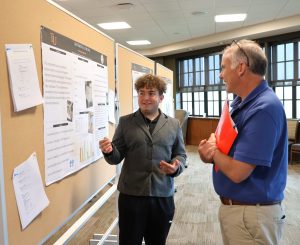
Elijah Garland, left, shows his poster to Dr. David Smith.
As they wrapped up their studies for this year’s academy, held at Tusculum University, students in the math, science and humanities areas showed their research posters and answered questions about their array of topics. Students who were part of the art program showed their creations in a variety of media, and other academy participants who were in the theater track performed improvisational comedy and performed monologues.
The presentations were held Wednesday, June 25, in the Brotherton Boardroom of the Meen Center, the lobby of Annie Hogan Byrd Fine Arts Center and the Marilyn duBrisk Theatre.
“We were delighted to demonstrate the impressive talent and brainpower of our students,” said Dr. David Smith, executive director of TRIO programs at Tusculum. “The Summer Academy is an excellent outlet for students to develop their abilities in much deeper ways that help prepare them for college and other aspects of their lives. This event is a highlight for us and illustrates the value of Upward Bound and Upward Bound Math and Science.”
The Summer Academy is held every summer at Tusculum and features morning classes that change every week. In the afternoon, students spend their five weeks in a specialized study area, where they have more focused learning in the subject areas that lead to the presentation. Students live on campus during the week and eat in the Tusculum cafeteria. In the academy’s final week, the students take a cultural trip that supplements what they have learned on campus.
Upward Bound and Upward Bound Math and Science are funded by federal grants.
Science and math projects
Upward Bound Math and Science students can choose from multiple topics in five or six subject areas, but they have flexibility in the way they gather data. Among the projects this year were the way heart rates can impact cognitive function, water quality, cold packs and the effect of weight on a marble’s ability to roll on a surface.
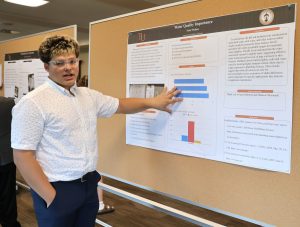
Peter Psahos discusses his poster.
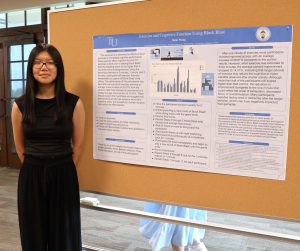
Shilo Wang stands by her poster.
As he works with his students, Aaron Barnett, an Upward Bound Math and Science academic advisor, focuses on teaching students the process of research. He wants them to recognize how the overall method is the same regardless of the subject. He said high school students need to learn how to perform research in the proper way to succeed at the next academic stage.
“College freshmen frequently lack research and research-based activities,” he said. “Because there are so many dual enrollment classes now, colleges want students to be able to conduct research as soon as they enroll.”
One of the items that causes students some headaches is learning how to correctly cite sources in their research. Barnett has his students use the American Psychological Association style, and learning that format will prove beneficial should they enter the science field.
Shilo Wang, a rising senior at Greeneville High School, who conducted the study titled “Exercise and Cognitive Function Using Block Blast,” said she really enjoyed the data analysis component of her research.
“I just like seeing the numbers and doing all of these silly formulas and seeing what trends pop up,” she said. “Through the academy, I have learned some additional speaking skills, too. Before, I was really socially anxious, and I am still that, but I am doing better than I was. I’m also a lot better at doing research and completing the formatting because I have done it before at the academy.”
Humanities research
Students in Upward Bound who participated in research conducted archival projects in which they had to sift through primary sources and connect them to the context of history. They also engaged with the historiography on their subject, said Kassidy Babler, an academic advisor for that program.
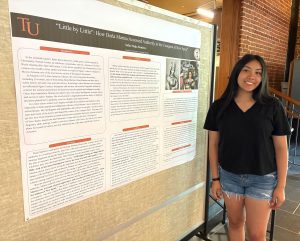
Sofia Mejia Ramirez shows her poster.
During the academy’s first week, which was conducted virtually, she and students examined the Thomas J. Garland Library web pages to discover all the facility offers to support research. Babler showed the students the databases that were approved for use for her research class, and students were able to pick any subject they wanted as long as the university had the resource material to support the project. In addition to creating a poster, students were required to write a research paper that used the Chicago style for formatting.
Subjects students tackled included female access to authority in the conquest of new Spain through a woman named Doña Marina as well as assimilation in the United States in the 19th century and its effect on indigenous family units.
“The students have done a great job,” Babler said. “A lot of them grew in this class and started thinking outside the box. They really had to work to think about how to organize their research and how to effectively communicate what they learned.”
Sofia Mejia Ramirez, who will be a sophomore at Chuckey-Doak High School in the fall, conducted the research for the Doña Marina project. In line with what Barnett said, the most challenging aspect for her was the citation requirements.
“I had never written a research paper before this,” she said. “I’ve been able to write essays but never long research papers. I was intimidated at first but over time, I became interested in it and grew to really love it. It’s going to help me in high school with writing essays. This research work really helped me to know how to write introductions and conclusion and make the body really long.”
Art projects
Students in the art track presented ceramic pieces, a surrealism landscape drawing created with charcoal and color pencil and graphite drawings using surrealism techniques.
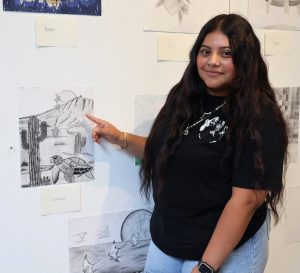
Jacqueline Diaz shows her artwork.
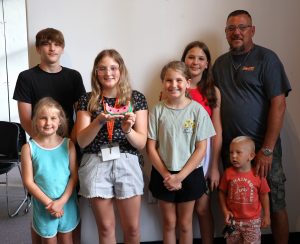
Makayla Stetson, third from the left, holds an art piece she created while she stands with her family.
Stephanie Callahan, an art teacher at Greeneville High, said she sought to move students out of their comfort zones to stir their creativity. She also wanted the students to have practice experimenting with different materials.
“They were able to use clay, color pencil, graphite and charcoal,” Callahan said. “We really delved into the surrealism techniques. We reviewed the five techniques, looked at examples and watched videos about different artists that use them. The students were given a lot of free rein to decide what path they wanted to take as long as they were incorporating those techniques within their artwork.”
Students came to the academy with various experience levels in art, and she was pleased with the results.
“It’s really easy, especially with AI, to just have things generated for you, but that wasn’t the case with these students,” Callahan said. “All of them sat there, took their time and came up with their own ideas.”
Eli Hardin, who is entering his junior year at South Greene High School, came to the academy with a long background of artwork. He said the academy has benefited him.
“Having the teacher there to help me and learn new approaches was great because there are certain things I didn’t know how to do and she would show me how to do them,” Jordan said. “That has really helped expand my knowledge. When it comes to drawing certain things, sometimes I can’t always get it, but she showed me a technique of using the computer to make outlines of certain pictures and then just copy what I have done on a paper to make it easier.”
Theatre offerings
Students in the theater track performed improvisational comedy skits and monologues during their performance. During their five weeks, they learned the techniques of Viola Spolin, the founder of improvisational comedy. Students also learned more generally about performance, acting methods, costumes, prop work and the way to put together a show. Plus, the students spent a lot of time developing monologues.
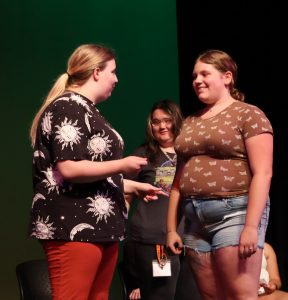
Students present improvisational comedy.
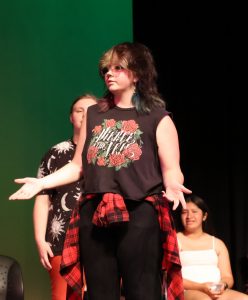
Madisyn Whittemore, foreground, performs a scene in an improvisational comedy skit.
“The large crux of what Erin is teaching is, ‘Why theater?’” said Steve Schultz, director of Tusculum Arts Outreach, referring to Erin Hensley Schultz, the university’s costume director. “She has provided a good bit of theater history as well as the ways to perform and improve. She is building the students’ confidence and their performances.”
Steve Schultz said it is important to students to learn about theater. He said it provides social benefits and helps participants further develop their empathy. Theater is also the best way to increase one’s reading and English scores for the ACT, he said.
“These students have been amazing,” he said. “They are so excited to be here and have had a great time. They are interested in becoming of part of Tusculum’s Young Actors Studio and seeking information about auditions for our upcoming shows of ‘Pollyanna.’”
Student Madisyn Whittemore, who will be a junior in the fall at David Crockett High School, said taking the theater class has helped her open up a lot more. She loved interacting with Erin Schultz and enjoys classes led by Steve Schultz.
“I would say I have gotten over stage fright a little more, which is ironic because I’ve been on the stage in other capacities since I was 3,” she said. “I’m also getting better with projecting my voice. I’ve become a bit more comfortable playing a character rather than being a stiff mess.”
To learn more about Upward Bound, please visit https://site.tusculum.edu/student-success/academic-affairs/first-gen/ub/. People can access additional detail about Upward Bound Math and Science at https://site.tusculum.edu/student-success/academic-affairs/first-gen/ubms/. Further information about the university is available at www.tusculum.edu.


